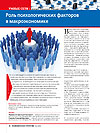Scientific and Methodological Approaches to the Problem of Creating a Model of an Enterprise’s Digital Twin
DOI: 10.33917/es-2.194.2024.54-63
The article dwells on scientific and methodological approaches to solving the problem of forming a model of a digital twin of an enterprise, the production process, products and resources at all stages of the life cycle, when all departments involved in development, production, operation, including repair work, are represented in the form of a computer network that unites the combined elements of three types: sensors (detectors), factors (actuators and devices), control and management bodies. Proposed scientific-methodological approaches and principles of a “virtual enterprise” modeling are quite universal since they permit to provide a reflection and mathematical description of the dynamics of changes in the performance of an enterprise, its divisions and transformation of properties and characteristics of high-tech products that occur during the production process.
References:
1. Gubinskiy A.M. Upravlenie tekhnologicheskim razvitiem v sfere oborony i bezopasnosti Rossii, SShA i Kitaya: istoricheskie aspekty i sovremennyy opyt [Managing Technological Development in the Sphere of Defence and Security of Russia, the USA and China: Historical Aspects and Modern Experience: Russia]. Vol. I. Rossiya. Moscow, Izdatel’skie resheniya, 2021, 626 p.
2. Computing Curricula 2005. The Overview Report. ACM and IEEE Computer Society, 2005, 62 p.
3. Bratukhin A.G., Dmitriev V.G. Strategiya, kontseptsiya, printsipy CALS: Rossiyskaya entsiklopediya CALS. Aviatsionno-kosmicheskoe mashinostroenie [Strategy, Concept, CALS Principles: Russian Encyclopedia of CALS: Aerospace Mechanical Engineering]. Moscow, OAO “NITs ASK”, 2008, pp. 15–26.
4. Kovshov A.N., Nazarov Yu.F., Ibragimov I.M., Nikiforov A.D. Informatsionnaya podderzhka zhiznennogo tsikla izdeliy mashinostroeniya: printsipy, sistemy i tekhnologii CALS/IPI [Information Support for the Life Cycle of Mechanical Engineering Products: Principles, CALS/IPI Systems and Technologies]. Ucheb. posobie dlya studentov vuzov. Moscow, Akademiya, 2007, 304 p.
5. Deryabin N.I., Kuprikov M.Yu., Markin L.V., Deniskin Yu.I., Bragintseva L.M., Evdokimenko V.N., Latysheva V.V. Kadrovoe obespechenie: Rossiyskaya entsiklopediya CALS: Aviatsionno-kosmicheskoe mashinostroenie [Personnel Support: Russian Encyclopedia of CALS: Aerospace Engineering]. Moscow, OAO “NITs ASK”, 2008, pp. 557–575.
6. Zhamoydik T.I., Revyakov G.A. Nauchno-metodicheskie podkhody k resheniyu zadachi modelirovaniya predpriyatiya na baze kontseptual’nykh polozheniy tsifrovykh tekhnologiy: Raketno-kosmicheskoe priborostroenie i informatsionnye sistemy [Scientific-methodological Approaches to Solving the Problem of Enterprise Modeling Based on the Conceptual Provisions of Digital Technologies: Rocket-space instrument engineering and information systems]. Vol. 8, vyp.
2. Moscow, RKS, 2021, pp. 32–42.
7. Vice Admiral Arthur K. Cebrowski, U.S. Navy, and John J. Garstka. Network-Centric Warfare: Its Origin and Future. January 1998.





